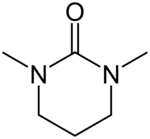DMPU
From Wikipedia, the free encyclopedia
| DMPU | |
|---|---|
 | |
| IUPAC name 1,3-Dimethyltetrahydropyrimidin-2(1H)-one | |
| Other names N,N'-Dimethyl-N,N'-trimethyleneurea | |
| Identifiers | |
| Abbreviations | DMPU |
| CAS number | 7226-23-5 |
| PubChem | 81646 |
| ChemSpider | 73671 |
| EC number | 230-625-6 |
| ChEMBL | CHEMBL12284 |
| Jmol-3D images | Image 1 |
| |
| |
| Properties | |
| Molecular formula | C6H12N2O |
| Molar mass | 128.17 g mol−1 |
| Density | 1.064 g/cm3 |
| Melting point | −20 °C; −4 °F; 253 K |
| Boiling point | 246 °C; 475 °F; 519 K |
| Solubility in water | miscible |
| Refractive index (nD) | 1.4875-1.4895 |
| Hazards | |
| MSDS | External MSDS |
| R-phrases | R22 R41 R62 |
| S-phrases | S26 S36/37/39 S45 |
| Flash point | 121 °C; 250 °F; 394 K |
| Except where noted otherwise, data are given for materials in their standard state (at 25 °C (77 °F), 100 kPa) | |
| Infobox references | |
1,3-Dimethyl-3,4,5,6-tetrahydro-2(1H)-pyrimidinone (DMPU) is a cyclic urea sometimes used as a polar, aprotic organic solvent. In 1985, Dieter Seebach showed that it is possible to substitute the relatively toxic hexamethylphosphoramide (HMPA) with DMPU.[1]
References
- ↑ Mukhopadhyay, T.; Seebach, D. (1982). "Substitution of HMPT by the cyclic urea DMPU as a cosolvent for highly reactive nucleophiles and bases". Helvetica Chimica Acta 65 (1): 385–391. doi:10.1002/hlca.19820650141.
Further reading
- Dehmlow, E. V. ; Rao, Y. R. (1988). "Phase Transfer Catalytic Preparation of the Dipolar Aprotic Solvents DMI and DMPU". Synthetic Communications 18 (5): 487–494. doi:10.1080/00397918808060741.
- Anderson, J. C.; Smith, S. C. (1990). "Oxodiperoxymolybdenum(pyridine)-1,3-dimethyl-3,4,5,6-tetrahydro-2(1H)-pyrimidinone (MoO5 · Py · DMPU): A Safer Alternative to MoOPH for the α-Hydroxylation of Carbonyl Compounds". Synlett 1990 (2): 107–108. doi:10.1055/s-1990-21003.
This article is issued from Wikipedia. The text is available under the Creative Commons Attribution/Share Alike; additional terms may apply for the media files.